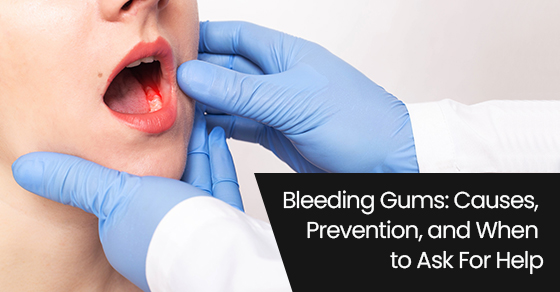
Your gums are not supposed to bleed. Although a little bit of blood may not seem like a big deal, it can point to a more serious oral health condition. Or, at the very least, it means that something needs to change with your dental hygiene routine, diet, or lifestyle.
If your gums are bleeding, it’s hard to think about anything else. After all, it’s an unpleasant, scary, and often painful experience. In order to find long-term relief, however, you need to understand why your gums are bleeding in the first place.
There are several potential conditions and causes behind your bleeding gums, including the following:
Let’s take a closer look at some of these causes.
Brushing your teeth is one of the most important things you can do for your oral health. However, improper brushing can actually damage your teeth and gums.
If you think you need to brush as vigorously and frequently as possible to avoid cavities, we’re here to tell you: ease up! When you brush too hard, you can hurt your gums and wear down your tooth enamel. Remember, gums are made of delicate tissue.
Always choose a toothbrush with soft nylon bristles. Medium and hard bristle brushes can cause red, swollen, and achy gums (and damaged enamel). When you brush, do so in gentle, circular motions that massage and clean your mouth. The back-and-forth motion can irritate and damage your gums.
If you rarely floss, then you may experience bleeding gums the next time you try to floss. Gums are delicate and sensitive, so they can react to new hygiene practices, even one as good for you as flossing! As you begin flossing more regularly, the bleeding should stop.
Ensure that you are using the proper flossing technique to minimize gum irritation: carefully slide the floss up and down while following the curve of each tooth, instead of forcing it between your teeth.
Bleeding gums can be a sign of gingivitis or periodontitis, which are both forms of gum disease. Gingivitis is the mildest version, caused by the buildup of plaque at your gum line. It can cause gums to become irritated, red, and swollen and bleed when you brush your teeth. Fortunately, gingivitis is reversible with good oral care.
If you do not take care of your gingivitis, it can worsen into periodontitis or periodontal disease. This is a long-term gum condition that is serious and requires professional treatment.
The disease damages the tissue and bone that supports your teeth, meaning that you can lose your teeth. As the disease progresses, your gums may become inflamed and infected, and pull away from the roots of your teeth. They also bleed very easily.
In most cases, it’s possible to prevent your gums from bleeding in the first place. There are several actionable things that you can do today to preserve gum health and avoid having bleeding, irritated gums. They all start with taking good care of your oral health.
A healthy mouth requires healthy habits. You need to build a rigorous oral hygiene routine that you stick to. Poor dental hygiene will lead you straight to bleeding gums and other oral health conditions, like tooth decay and gum disease.
Brushing twice a day for two whole minutes (using a soft-bristled toothbrush and fluoride toothpaste) and flossing once per day are necessary steps to removing plaque.
When you don’t remove plaque, it accumulates along the gum line and calcifies into tartar, which can only be removed by your dentist. Plaque and tartar buildup irritates your gums, causing them to bleed and contributing to cavities and gingivitis.
Additionally, you should visit Oakville Place Dental for a regular checkup every six months.
A nutritious diet plays an important role in keeping your gums healthy. Try to keep sugary foods and beverages to a minimum, as these create the ideal environment for plaque to form.
The bacteria in your mouth loves to feed on sugar; when it does, it produces acid (which wears down your enamel) and plaque (which irritates your gums and accelerates the formation of cavities). Essentially, a diet high in sugar causes a range of problems for your mouth.
Instead, focus on eating a healthy, balanced diet full of vegetables, fibrous whole grains, and fruits. You’ll eat less sugar and consume more vitamins. Vitamins C and K are particularly important for gum health.
Smoking is horrible for your gum, oral, and overall health. Specifically, it increases your risk for gum disease by reducing blood flow to the gums. As your gums are deprived of oxygen and nutrients, they become vulnerable to bacterial infection. Tobacco also increases gum sensitivity, which can cause them to bleed.
One of the best things you can do for your health is to stop smoking and using tobacco products.
If your bleeding gums persist for two weeks, you should contact a trusted emergency dental office–Oakville Place Dental. Alternatively, please contact us immediately if you are experiencing severe bleeding and swollen gums or if you have sustained an injury that is causing your gums to bleed.
For non-emergency cases, first try to step up your oral care routine. Commit to brushing twice a day with proper techniques, using mouthwash, and flossing once daily. Minor gum irritation caused by low plaque buildup can be alleviated with proper oral care.
Oakville Place Dental offers emergency dental services to help you in your time of need. Severely bleeding or injured gums should be looked at immediately. In these cases, use gauze and a cold compress to slow the bleeding and soothe your gums. Then, please call our emergency dental office at (905) 842-6030.
We also offer a wide range of dental services, including professional cleanings and examinations. These appointments are crucial for your long-term oral health and play a vital part in preventing gum bleeding.
For emergency dental care in Oakville, call Oakville Place Dental at 905-842-6030 or contact us here.
 0 Comment
0 Comment